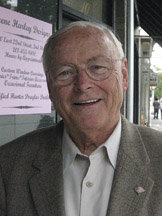Five members on the Board of Directors for the former Pamrapo Savings Bank will have to pay $80,000 in fines cumulatively for allowing illegal activity to go on during their watch over the bank.
The Office of Thrift Supervision (OTS), the federal banking agency which oversees the industry, issued the fines in July for “engaging in unsafe and unsound practices” and failing to have adequate policies in place to prevent illegal transactions that took place between March 2005 and September 2006.
Richard Pellegrini, who did painting and other bank repairs, pled guilty two years ago to using family members, including one as a branch manager, to illegally cash checks in violation of federal law.
‘This is a lot like paying a traffic ticket.’ – Patrick Conaghan
________
Bank officials were unaware that the scheme also violated federal law because the transactions were supposed to have been reported to the OTS, which monitors transactions of more than $10,000 as part of its anti-terrorism activities. While Pellegrini’s checks were generally under $10,000 each, he frequently cashed more than one a day, which should have been reported.
But bank policy allowed managers to authorize the cashing of checks for certain groups, such as state employees. They were apparently not reported to the federal government, and Pellegrini’s scheme apparently caused the bank to violate the law.
“Pamrapo Savings Bank’s repeated and blatant [alleged] violation of the Bank Secrecy Act shielded criminals and their activities from detection and prosecution by law enforcement. This case should send a strong message to banks that we will vigorously investigate and prosecute financial institutions that provide safe harbor to criminals,” said U.S. Attorney Paul J. Fishman.
Bank trustees fined
The bank was fined $5 million earlier this year. In the latest round, five members of the Board of Trustees were fined as well. Pamrapo has since merged with Bayonne Community Bank.
Daniel Massarelli, former chairman of the Pamrapo directors, was fined $27,500. Herman Brockman, Robert Doria and Patrick Conaghan were fined $15,000. Board member Kenneth Poesl was fined $7,500.
Conaghan, a former candidate for mayor of Bayonne, said the fines were less costly than the legal expenses required to fight the case.
“This is a civil agreement, not criminal. This is an administrative procedure, a technical violation. This is a lot like paying a traffic ticket,” said Conaghan, who is a lawyer and a former municipal judge. “We are paying these fines in order to dispose of this matter. But it is without admitting or denying anything.”
Conaghan said as directors of the bank, they are saddled with the responsibility for what happens under their watch, but in some ways called it “a raw deal.”
OTS, prior to this investigation, he said, had been dressed down by the House of Representatives for enforcement failures.
“We were the first case after that, and so they came after us hard,” Conaghan said. “It was a good education for all of us.”
But Conaghan said no one lost any money during their period.
Case caused a policy review
Conaghan said the money-laundering scheme made the directors aware that the bank’s policies needed to be reviewed and modified to keep anything like this from happening again. But he said it was not as blatant a violation as federal authorities claim, and that management was just as surprised by the scheme as anybody else, and that this was not a terrorist or money laundering operation.
“The only loss to the bank is the fines,” he said. “In our last audit, we came through with flying colors. These fines are because of conduct done years ago.”
Pamrapo Savings Bank, in a statement issued to the court, admitted that it violated the Bank Secrecy Act to avoid the expenses associated with compliance, despite federal and state banking regulators telling Pamrapo Savings Bank as early as 2004 that its Bank Secrecy Act and anti-money laundering programs contained serious and systemic deficiencies in critical areas required under the law.
Al Sullivan may be reached at asullivan@hudsonreporter.com.
